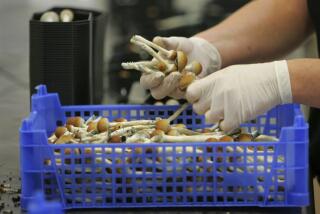Administration Efforts to Curb ‘Crack’ Assailed as Inadequate
- Share via
WASHINGTON — The Reagan Administration’s efforts to fight drug abuse, particularly cocaine and its cheap derivative called “crack,” came under broad criticism Tuesday from both Democrats and Republicans in Congress.
Panels in both the Senate and the House heard testimony about crack, also known as “rock,” and some lawmakers said that the Administration has demonstrated a penchant for much talk but little action on the issue.
“We say there’s a war on drugs, but we haven’t dedicated the resources necessary to win that war,” said Sen. Alfonse M. D’Amato (R-N.Y.), a member of the Senate Government Affairs permanent subcommittee on investigations.
Hold Joint Hearings
“We must treat drugs as a national security issue,” said Rep. Peter W. Rodino Jr. (D-N.J.), who joined several other congressmen in a press conference before a joint hearing of two House panels, the Select Committee on Children, Youth and Families and the Select Committee on Narcotics Abuse and Control.
Attention to cocaine and its consequences has heightened in recent weeks after the deaths of University of Maryland basketball star Len Bias and Cleveland Browns football player Don Rogers, whose deaths were linked to the drug. Moreover, although recent studies have indicated that cocaine use has leveled off in recent years, the number of deaths and serious injuries resulting from the drug, especially from forms like crack, has risen sharply.
Crack, which is smoked, is formed after cocaine powder is heated and reduced to a purified base. It is said to produce an intense state of euphoria followed by a severe anguish--which, in turn, can be eliminated only by another “high.”
Defends Federal Effort
Charles R. Schuster, director of the National Institute on Drug Abuse, an arm of the Department of Health and Human Services, defended federal efforts during Tuesday’s Senate hearing. He said that his agency will spend $7.5 million this year on research and education, including an advertising campaign.
First Lady Nancy Reagan has led drives against drug abuse across the nation and presidential aides reportedly have discussed heightening the President’s role in the efforts.
For some lawmakers, however, that has not been enough.
California Rep. George Miller (D-Martinez), chairman of the youth and families panel, said that the federal effort “is absolutely in a shambles.” Rep. William J. Hughes (D-N.J.) agreed: “Nobody’s in charge. There’s nobody looking at the total picture.”
‘New Pied Piper’
Rodino, calling crack “the new Pied Piper of American youth,” said he has proposed to President Reagan the creation of a national conference on drugs. D’Amato, taking a step further, endorsed the use of U.S. military forces to stop drug smugglers.
Witnesses told both the House and Senate panels of the horrors of crack. It is a drug, the congressmen were told, that ruins the lives of rich and poor, in communities large and small.
A Washington, D.C., man who said he worked for the last five years in “crack houses,” where the drug is sold, told senators about its widespread use among youths.
The man, hidden behind a screen and speaking under the assumed name of Michael Taylor, said that a person can become addicted to crack after the first smoke and that teen-agers are easily absorbed into crack dens.
Says Youths Heavily Involved
The den has become a social meeting place, “like a bar,” Taylor said. Youths who serve as couriers and lookouts for crack dealers are “paid well,” he added, and often are aged “14, 15, 16--it doesn’t matter. You could be 10 years old.”
Taylor, 29, said he “cooked” cocaine into crack for patrons of drug houses both from the slums of Washington and from affluent sections of nearby Silver Spring, Md.
Yale University medical Prof. Robert Byck, who also testified before the Senate panel, urged the government to “put your money where your mouth is” to fight crack, which he said is so cheap and available that “it’s as though Ray Kroc (the late founder of McDonald’s fast-food restaurants) had invented the opium den.”
More to Read
Sign up for Essential California
The most important California stories and recommendations in your inbox every morning.
You may occasionally receive promotional content from the Los Angeles Times.










